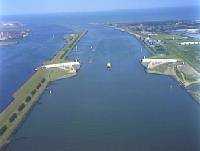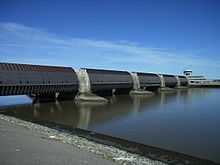Flood barrier

A flood barrier, surge barrier or storm surge barrier is a specific type of floodgate, designed to prevent a storm surge or spring tide from flooding the protected area behind the barrier. A surge barrier is almost always part of a larger flood protection system consisting of floodwalls, levees (also known as dikes), and other constructions and natural geographical features.
Flood barrier may also refer to barriers placed around or at individual buildings to keep floodwaters from entering those buildings.

Flood barriers around the world
Delta Works
The Delta Works in the Netherlands is the largest flood protection project in the world. This project consists of a number of surge barriers, the Oosterscheldekering being the largest surge barrier in the world, 9 kilometres (5.6 mi) long. Other examples include the Maeslantkering, Haringvlietdam and the Hartelkering.

Thames Barrier
The Thames Barrier is the world's second largest movable flood barrier (after the Oosterscheldekering and the Haringvlietdam) and is located downstream of central London. Its purpose is to prevent London from being flooded by exceptionally high tides and storm surges moving up from the North Sea. It needs to be raised (closed) only during high tide; at ebb tide it can be lowered to release the water that backs up behind it.

New Orleans
In 2009 the United States Army Corps of Engineers started construction of an ambitious project that aimed to prevent storm surges from flooding the city by 2011. The IHNC Lake Borgne Surge Barrier on the confluence of these waterways[1] is the largest in the United States. The new Seabrook floodgate prevents a storm surge from entering from Lake Ponchartrain. The GIWW West Closure Complex closes the Gulf Intracoastal Waterway to protect the west side of the city. This complex is unique in that it contains the world's largest pumping station, necessary to pump out rainwater that is discharged in the protected side of the canal during a hurricane.[2]

Eider Barrage
The Eider Barrage is located at the mouth of the river Eider near Tönning on Germany’s North Sea coast. Its main purpose is protection from storm surges by the North Seas. It is Germany’s largest coastal protection structure.
St. Petersburg Dam
The Saint Petersburg Dam (officially called the Saint Petersburg Flood Prevention Facility Complex) is a 16 km (9.9 mi) barrier separating the Gulf of Finland from Neva Bay to protect the city of Saint Petersburg, Russia from coastal flooding. The Soviet Union started construction of the barrier in 1978 and it was completed and made operational in 2011.
New England
The New Bedford Harbor Hurricane Barrier protects the city of New Bedford, Massachusetts, with a mostly immovable barrier of stone and fill. It has three land and one marine door for access in calm seas.
The nearby Fox Point Hurricane Barrier protects the city of Providence, Rhode Island.
The US Army Corps of Engineers also owns and operates the hurricane barrier at Stamford, CT.
Venice
The MOSE Project is intended to protect the city of Venice, Italy, and the Venetian Lagoon from flooding.
Local Flood Barriers
Flood barriers may be placed temporarily or permanently around individual buildings or at building entrances to keep floodwaters from entering those buildings. A wall constructed of sandbags is an example of a temporary barrier. A reinforced concrete wall is an example of a permanent barrier.[3]
Flood barriers can be manufactured to meet governmental or industry standards.[4] Certification is available through third party testing laboratories, such as FM Approvals, a division of FM Global[5]
References
- ↑ USACE:Inner Harbor Navigation Canal Surge Barrier website
- ↑ popsci.com:How It Works: Protecting New Orleans With The World's Largest Flood Pump
- ↑ U.S. Army Corps of Engineers, FLOOD PROOFING, EP 1165-2-314
- ↑ U.S. Army Corps of Engineers, FLOOD PROOFING, EP 1165-2-314, ch. 7
- ↑ http://www.floods.org/index.asp?menuid=421&firstlevelmenuid=183&siteid=1